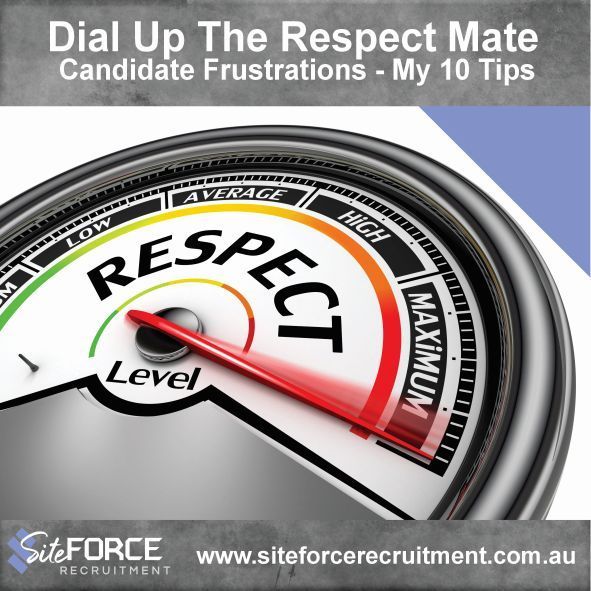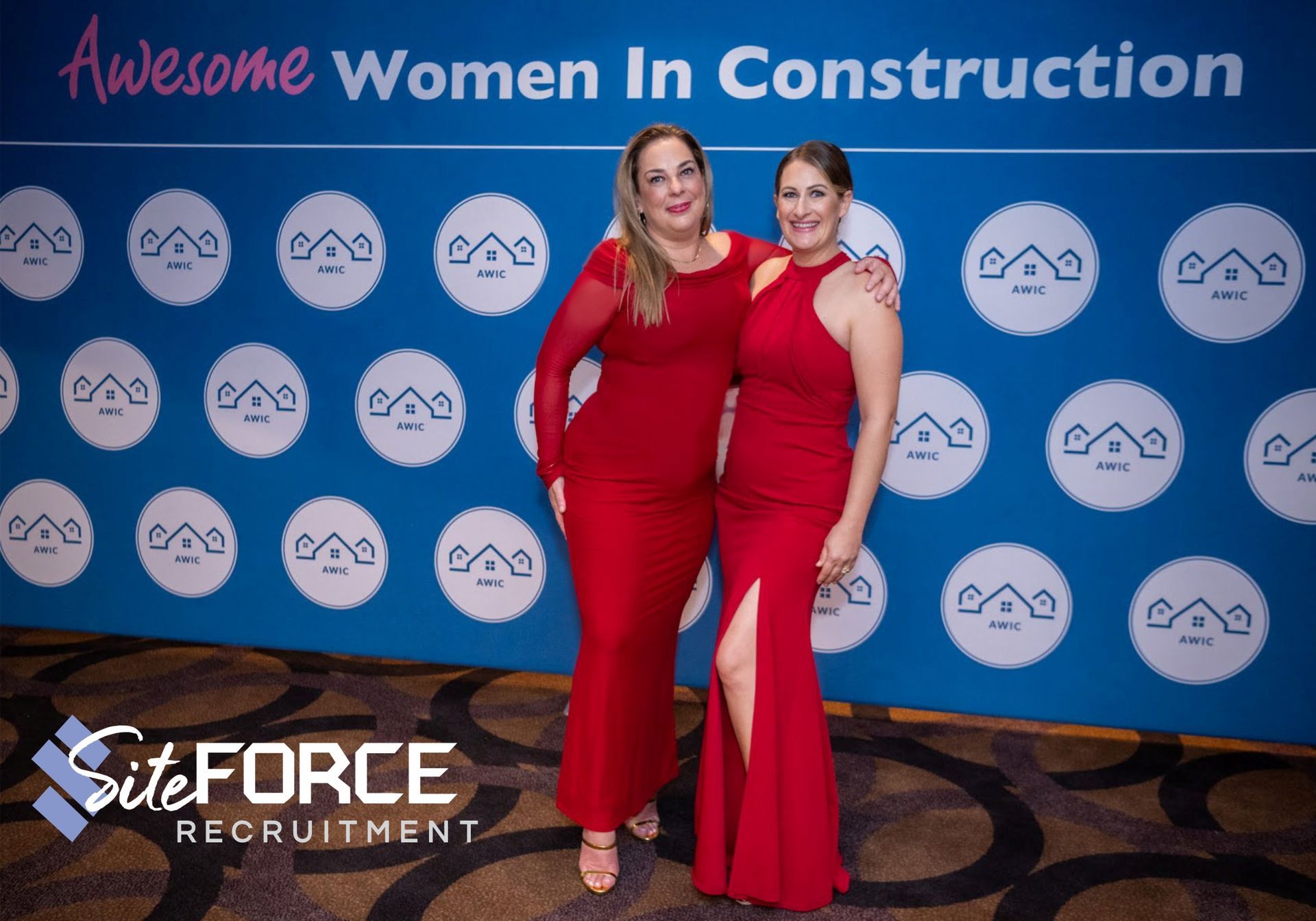DIAL UP THE RESPECT MATE
My 10 Tips For Dealing With Candidate Frustrations

Recently I had a candidate ring me that was already at 120% on the frustration scale and full of insults. Yep, I know what you’re thinking – not a great first impression is it?
In the end, after navigating a series of insults and guiding the candidate through the ‘submit’ button that he had missed, we got there, and he got back to single digits in his stress levels, and an apology followed.
It got me thinking however, how much I am seeing people’s stress notched up a bit at this time of year. I know in our industry this time of year is generally stressful – projects are coming to completion for the year, people are being laid off, tradies have periods of no work and income, and inflation has taken it up another level. I’ve written two previous blogs to help during the Christmas period around money and planning (see below), but this year I wanted to discuss the subject about how do you deal with Candidates that are frustrated or delivering a line of insults without losing your mind.
https://www.siteforcerecruitment.com.au/tradies-toolkits-must-include-a-solid-budget
https://www.siteforcerecruitment.com.au/siteforce-christmas-cash-considerations-tips
In any workplace, stress is a constant factor—whether it's the pressure of deadlines, uncertainty about job security, or just the simple wear and tear of busy seasons. It’s especially common in industries like recruitment and construction, where tight margins, high demands, and a ticking clock add to the pressure.
At times, this stress boils over into frustrations and can include the occasional insult - intentional or not. When emotions run high from others, it's easy to let a heated moment get the better of us. But as a recruiter dealing directly with both clients and candidates, keeping your cool in such situations is not just about saving face. It’s about maintaining effective relationships, being a steady force in challenging moments, and handling candidates in a way that resolves issues rather than escalating them.
Here are my 10 tips for dealing with candidates and their frustrations:-
1. Take a Breather and Assess the Situation
The first step in managing a situation where insults or negative comments are thrown your way is to pause. Take a deep breath, give yourself a moment, and assess the context. The immediate reaction might be to defend yourself or fire back with a quick remark, but in high-stress situations, this often leads to further escalation. Research shows that emotional reactions, such as anger or frustration, can impair judgment and hinder problem-solving. Instead, step back, assess whether the insult is a reaction to stress or an actual attack, and respond from a place of clarity, not defensiveness.
2. Pick Your Battles
Not every insult demands a confrontation. As much as it might sting, sometimes letting things slide is the best option and keeping your response professional can reset the tone of the conversation. It may be the case that you insert “We just need to dial up the respect in this conversation” or “we need to take this conversation down a notch” to get things back on track. Picking your battles wisely doesn’t mean tolerating disrespect - it means saving your energy for situations that truly warrant a response. According to communication experts, addressing every minor insult can drain your emotional resources and create unnecessary tension. Instead, focus on what matters most - if it’s a significant remark that threatens your relationship with a client or candidate, then it’s time to address it.
3. Ask the Right Questions
Sometimes, a simple but well-placed question can diffuse tension and even prevent future misunderstandings. Asking questions like, “Can you clarify what you meant by that?” or “Is there something specific that’s concerning you?” invites the other person to explain themselves without you making assumptions. This approach can shift the conversation to a constructive path and allows both parties to better understand each other's perspectives.
In recruitment, for instance, understanding what might be driving a candidate’s frustration can often reveal underlying concerns that need addressing -whether it’s job security, work-life balance, or role expectations. Using questions to draw out these issues can not only ease tension but also lead to practical solutions, fostering trust and helping both candidates and clients feel heard.
4. Respond Assertively, Not Aggressively
When it’s time to respond to a candidate who may have made a tense or critical comment, aim for assertiveness over aggression. This means focusing on clear, respectful communication rather than confrontational language. For example, instead of saying, "You always seem unhappy about providing answers required by an employer," try an "I" statement like, "I felt concerned when you mentioned dissatisfaction with the recent questions asked" This keeps the focus on how the comments appear to you, without sounding accusatory or blaming. Not only does this reduce friction, but it also establishes a standard for handling future conversations respectfully. Studies on emotional intelligence show that assertive communication promotes mutual respect and understanding, whereas aggression can lead to defensiveness and further conflict.
5. Seek Clarification Before Jumping to Conclusions
Misunderstandings happen, especially when emotions are running high. A comment that sounds like an insult might simply be a result of poor communication or a difference in perspective. Rather than jumping to conclusions, take the initiative to seek clarification. Ask the person directly what they meant by their remark, ideally in a private setting. This gives them the chance to explain themselves and provides an opportunity to clear the air. According to workplace communication experts, seeking clarification before assuming bad intent can help reduce misunderstandings and prevent unnecessary conflict.
6. Managing Expectations – “And I’ll Have a Unicorn with That”
Some candidates are simply unrealistic in their expectations (I call it ;’asking for a unicorn to be delivered with the package’) and they can lash out due to dissatisfaction with salary expectations, job flexibility, and sometimes, even meeting minimal standards for a job.
It’s essential to address these expectations with both clarity and empathy. Start by acknowledging the candidate’s frustrations, which may stem from stress or financial strain, and then share a grounded perspective on the situation. If a candidate lashes out due to dissatisfaction with expectations, job flexibility, etc., use it as an opportunity to explain current market realities and discuss what factors influence employment options, like experience, location, and skills in demand.
Offer constructive advice on how they might meet their goals over time, such as skill development or alternate career paths. By responding professionally, you not only de-escalate the immediate situation but also establish yourself as a reliable advisor, focused on long-term success rather than just the present challenge. This balanced approach helps maintain mutual respect and keeps conversations productive, fostering trust even in high-tension moments.
7. Paint a Picture
When candidates feel frustrated about not landing their "perfect" job, it’s essential to remind them of the value of flexibility and persistence and paint a picture for them in how to get there in alternative ways. The ideal role might not come straight away, but consistent work experience can open doors that constant job-hopping may not. Taking temporary or labour-hire roles as a pathway to permanent positions, for example, can give candidates a chance to build skills, prove their reliability, and form strong networks within the industry. A flexible approach - being open to different job types, companies, and roles - often leads to a more fulfilling career path than waiting for that one perfect job with a sky-high salary. It’s about demonstrating commitment, reliability, and growth potential (building their own good reputation), which employers respect and are likely to reward with opportunities for progression. By showing they’re invested, candidates can create opportunities for themselves, often landing closer to that ideal role in the long run.
8. Coaching Candidates How To Become Indispensable
Spotting great potential in a candidate often begins with the basics. They have an up-to-date, well-organised resume, complete the registration process smoothly, and stay available and communicative. Their certifications, references, pre-employment checks are sorted, and timesheets arrive on time. These candidates are straightforward to work with and show they understand what it means to be a team player. There’s no repeated chasing, frustration, or last-minute excuses. Naturally, when I find myself inspired by their reliability and organisation; they become part of my ‘indispensable’ team. They’ve invested the time and effort to build a great reputation with me. And when the time comes for them to aim for a permanent position, I’m ready to vouch for them as a quality candidate.
When you have a candidate that has taken the pathway of taking temporary or labour-hire roles as a pathway to permanent positions, coach them into how to do this successfully. I know this sounds basic, but often the basics are missing these days. It’s also key to prepare them for potential frustrations. Sometimes their efforts may feel unacknowledged, or they might be juggling more than others in similar roles. Remind them that their long-term goals will benefit from patience and resilience and that building trust and respect within the company takes time. Encourage them to stay receptive to feedback and to continue working on their teamwork and adaptability - qualities that often make them indispensable. With a proactive and resilient attitude, candidates can become the type of person that companies want to make room for them in their teams, even if a permanent role hasn’t officially opened up.
Encouraging them to be reliable, meet deadlines, and take on extra responsibilities helps them build a reputation of trust. Show them how offering solutions rather than pointing out problems is a great way to make themselves stand out as a proactive team member. Ideally, this will lead the company to recognise their value and make room on the team for them. With consistency and reliability, these candidates aren’t just ‘doing a job’; they’re becoming an asset - and someone who, like others on my team, is hard to replace.
9. Leverage Your Support Network
Handling candidate frustrations and sometimes insults can be emotionally taxing, and it’s easy to feel isolated when tensions are high. Build a support network of trusted colleagues or mentors who can offer advice, lend a sympathetic ear, or provide alternative perspectives on the situation. Talking things through with someone who understands the context can help you navigate the emotional aspects of the situation. Moreover, discussing sensitive issues with HR or a supervisor can offer guidance and ensure that any underlying issues are addressed before they escalate.
10. Know When It’s Time to Step Away
In recruitment, maintaining a professional database is crucial, and sometimes it’s necessary to remove candidates who demonstrate persistent unprofessional or disruptive behaviour. If a candidate continually exhibits problematic attitudes - like discriminatory remarks, a hostile approach, or a lack of respect during interactions - keeping them in your system can risk your agency’s reputation and relationships with clients. By documenting each concerning incident and communicating openly with the candidate about expectations, you offer them a chance to correct their behaviour. However, if issues persist, removing the candidate from your database is a step towards ensuring that your placements align with a respectful and constructive work environment for everyone involved. This action underscores your commitment to quality and reinforces trust with clients who rely on you to provide professional, reliable candidates.
Stress, especially around key periods like the lead-up to Christmas, can sometimes make things feel like they’re on the edge. But when we encounter frustrations or insults at work, especially as recruiters balancing multiple clients and candidates, it’s vital to manage our response with professionalism and composure. By taking a moment to breathe, choosing battles wisely, communicating assertively, seeking clarification, coaching where needed and leaning on a support system, we can resolve conflict more effectively and maintain positive relationships. Treating one another with respect, even in stressful times, helps ensure a healthier and more productive work environment for all. So, let’s take a deep breath, keep our cool, and continue to support each other through the busy season ahead.
Our Superpower
Our leading 'superpower' is attracting and retaining quality team members who share our values of honesty, integrity, diligence, and service, allowing us to deploy quality team members on client sites quickly.
Our team member's superpower is being motivated, prepared and ready to enthusiastically contribute to the projects at hand, more than just a pair of hands.
Related articles:
Read other informative articles for both employers and workers at: https://www.siteforcerecruitment.com.au/blogs
Chantal Penny is the Director with Superpowers of SiteForce Recruitment. A thought leader in the industry, Chantal, based on her expertise and industry perspective, offers unique guidance, inspiration, and influence in the industry. Chantal Penny is also a thought leader in the industry with her Podcast, Talent Instinct, which is available at:
https://talentinstinctpodcast.libsyn.com/site
At SiteForce Recruitment, we specialise in labour-hire and permanent recruitment in the construction industry. We are committed to valuing people, safety and wellbeing, collaboration, trust and, of course – results!
CONNECT with us via our contact page or bookings links on our website if you are looking to recruit for, get your dream job, or join our amazing labour force team.











